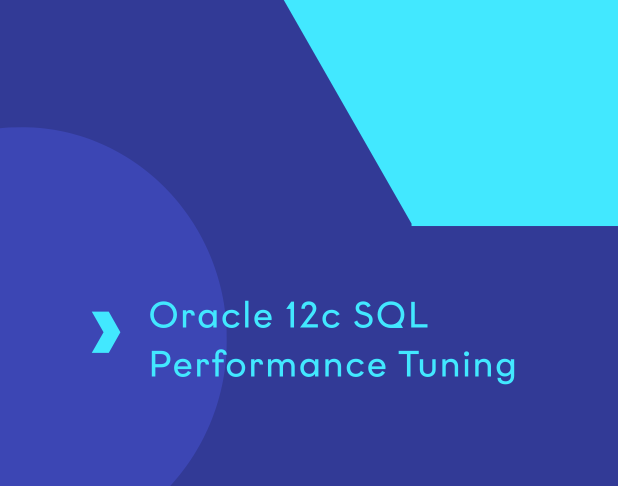Gain practical experience improving SQL efficiency on Oracle systems. With this course, you’ll focus on improving the efficiency of SQL queries in Oracle databases, as well as explore execution analysis, indexing strategies, and diagnostic tools to enhance real-world application performance.
Black Friday sale - up to 40% off training courses – use code: BLACKFRIDAY25UK
Oracle 12c SQL Performance Tuning
Select your learning method

Master efficient SQL for faster performance
In this two-day course, you’ll get under the hood of SQL in Oracle 12c and newer. You’ll learn what hinders performance, how to investigate queries, and how to fix them, fast. With practical labs and expert guidance, you’ll build confidence quickly.
- Select a suitable tuning strategy
- Interpret execution plans with confidence
- Improve SQL and app responsiveness
- Work with and manage statistics
- Apply SQL Tuning Advisor insights
- Diagnose underperforming queries
- Optimise and manage indexes
- Influence execution paths using hints
What you’ll learn
Across two days of guided training, you’ll explore Oracle’s most effective SQL tuning features. You’ll learn how to pinpoint problem queries, and even more importantly, how to fix them using the right techniques and tools.
SQL tuning advisor
The SQL Tuning Advisor is a powerful built-in Oracle tool that helps you find and fix poorly performing SQL. In this course, you’ll learn how to use it from inside SQL Developer, so you can quickly analyse statements and review suggested improvements. We’ll walk you through how it works, what the different types of advice mean (like creating indexes or rewriting SQL), and how to interpret the results confidently. You’ll leave knowing when to trust the tool and when to go beyond it with your own expertise.
Hints and query tips
Hints give you a way to influence how Oracle runs a query. In this session, we look at different types of hints, like those that suggest access methods, join operations, and query transformations, and explain how to use them effectively. You’ll learn how to guide the optimiser without misapplying or overusing hints, and how to combine them with good query design. We’ll also explore when hints are useful for solving specific performance issues, and when they might cause more harm than good in the long term.
Query structures and performance
How you structure a query plays a big role in how well it performs. We’ll explore practical ways to improve query design, including simplifying logic, reducing unnecessary joins, and managing views and subqueries. You’ll learn how Oracle handles features like the WITH clause, virtual columns, bind variables and result caching...all of which can impact efficiency. We’ll also look at PL/SQL-related considerations and database settings that influence performance. By the end, you’ll know how to write cleaner, faster SQL that Oracle can optimise more effectively.
- Two days of instructor-led training in a live virtual classroom
- Interactive hands-on live labs
- All relevant course materials
- Certificate of attendance
Key facts
Devs, analysts, support teams and technical specialists who write or troubleshoot SQL in Oracle and want to improve their database’s performance.
You should be confident using Oracle SQL. If you’ve completed an introductory or advanced SQL course, or have equivalent hands-on experience, you’ll be good to go.
Our experienced trainers and interactive labs create a focused, practical environment – so you can put theory into practice from day one.
FAQs
This practical course focuses on identifying and fixing slow SQL in Oracle databases. You’ll use real tools, apply proven methods, and leave with performance tuning skills you can apply immediately.
How will I learn to interpret SQL execution plans?
You’ll use tools like EXPLAIN PLAN and Autotrace to break down SQL execution paths and understand the decisions the Oracle optimiser makes. This helps you identify performance bottlenecks and optimise queries more effectively.
Does the course cover how to manage Oracle statistics?
Yes, you’ll learn how to collect, manage and interpret database statistics using tools like DBMS_STATS. Accurate statistics are essential for the Oracle optimiser to make informed decisions, and this course shows you how to handle them confidently.
Will I learn about using indexes for performance gains?
Absolutely. You’ll explore when and how to use B*Tree, bitmap and function-based indexes, as well as strategies for index selection and avoiding common pitfalls that can prevent Oracle from using them efficiently.
Does the course explain how to use the SQL Tuning Advisor?
Yes, you'll get hands-on guidance on using the SQL Tuning Advisor within Oracle SQL Developer. This includes interpreting its recommendations and applying them to fine-tune SQL queries for better performance in real-world scenarios.
What our customers say

‘Very well laid out and John does an amazing job of explaining things in detail.’

‘This is now my second course with John at ILX and once again the delivery was simply excellent. I was a little bit worried coming in that I wouldn't have the requisite knowledge, however, I found that it was just about the perfect level between being able to understand the concepts and stretching the grey matter. Best fun I've had at work for a while now and would very highly recommend the course to anyone who's taking on more PL/SQL work in their job. Hoping to come back for more in the future!’
Join the half a million learners developing their skills with our training
A trusted partner to thousands of organisations worldwide
Our passionate team goes above and beyond to support customer needs
Please complete the form to ensure your quote is accurate and we will contact you soon.